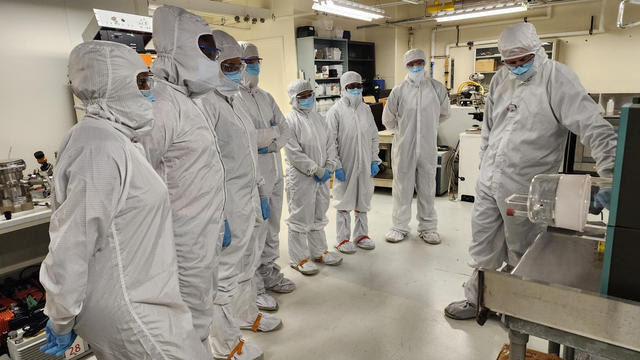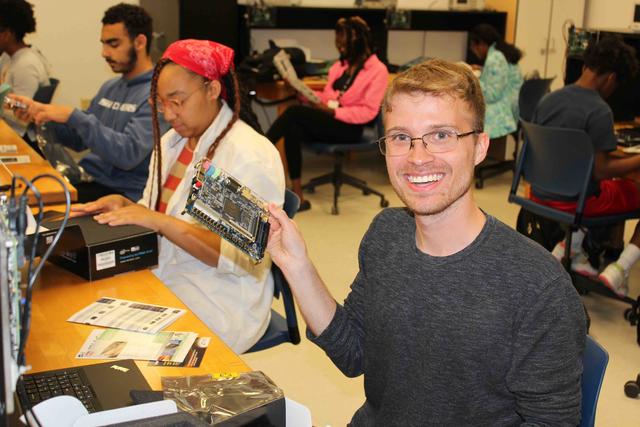
Semiconductor Processing Certificate

The online semiconductor processing certificate program, offered by the Semiconductor Education and Research Program at John W. Garland College of Engineering, Science, Technology, and Agriculture, is your gateway to learn from experienced professionals and gain practical skills that open doors to job opportunities in leading companies like Intel.
Dive into the future of tech with our online 30-credit certificate program in semiconductor processing! Crafted with industry experts, our program covers critical topics like semiconductor device physics, robotics and automation, artificial intelligence, and VLSI design and fabrication. Designed to combat the workforce shortage in the semiconductor industry, our program prepares you for a rewarding career in this high-demand sector.
The new program complements the 2023 Intel-sponsored summer internship program.
Join us to amplify your career prospects and contribute to the semiconductor industry's growth. Begin your journey with our certificate program in semiconductor processing today — your gateway to a dynamic career in tech!
Semiconductor processing certificate courses
Our 30-credit certificate program in semiconductor processing features nine credits in mandatory courses and 21 credits in elective courses.
Mandatory courses (9 credits):
-
INT2210: Semiconductor Device Physics (3)
-
INT2220: Statistical Process Control for Semiconductors (3)
-
INT2230: Robotics and Automation (3)
Elective courses (21 credits):
-
CPS2271: Data Structures (3)
-
CPS3200: Computer Algorithms (3)
-
CPS3340: Computer Architecture (3)
-
CPS4210: Artificial Intelligence (3)
-
INT2311: Circuit Analysis I (3)
-
INT2420: Indust. Instr. and Process Control (3)
-
INT2430: Electronic Devices & Circuits (3)
-
INT3520: Digital Systems (4)
-
MFE4710: Measurements and Instrumentation (3)
-
INT4220: VLSI Design and Fabrication (4)

Whether you're a high school graduate seeking a strong start or a professional considering a career shift, our semiconductor processing certificate program opens doors to a dynamic industry and bridge to significant companies like Intel.
Mohammadreza Hadizadeh, Ph.D.Program Director
Semiconductor processing admissions requirements and financial aid

-
At Central State University, we are dedicated to making your education in semiconductor processing financially achievable. We proudly offer a 100% textbook-free program through the use of open educational resources. For those who meet the requirements, financial aid options are available. Our financial aid advisors are ready to guide you through the process and answer any queries you may have.
-
Admission requirements for the semiconductor processing program include the following:
- Applicants must have a high school GPA of 3.0 or higher and a passing grade in a college-level mathematics course (such as college algebra or higher).
- Alternatively, a cumulative college-level GPA of 3.0 or above from an accredited institution will also be considered.
-
Mandatory courses (9 credits):
INT2210: Semiconductor Device Physics: This course covers the fundamental concepts of electronic devices, including semiconductor materials, p/n junctions, Schottky barriers, and various types of transistors, such as bipolar junction transistors and metal-oxide-semiconductor field-effect transistors. Additionally, it covers other topics like light emitters, photodetectors, and solar cells. This course provides students with a broad understanding of advanced electronics, photonics, and integrated circuit design.
INT2220: Statistical Process Control for Semiconductors: This course introduces the subject of statistical process control for semiconductors manufacturing. The course includes important qualitative definitions and quantitative procedures for process improvements, quality assurance, and quality control within the context of the semiconductors industry. The course covers the fundamentals of statistical process control methods, such as probability and statistical process modeling, designing and using process control charts for offline and online quality control, experimental design, acceptance sampling methods, and process standardizations.
INT2230: Robotics and Automation: This course provides students with basic terminology, theory, and the application of automation, robotics systems, and Industry 4.0 technologies. Topics covered will include the selection, construction, and classification of robots and automation equipment, as well as safety considerations, artificial intelligence, and vision systems.
Elective courses (21 credits)
CPS2271: Data Structures: This course introduces students to data structures, including topics on linked lists, doubly linked lists, circular lists, stacks, queues, search strategies, hashing, internal sorting algorithms, external sort/merge algorithms, binary trees, B-trees, B+- trees, sequential files, random access files, file update algorithms, bit maps, and memory management algorithms.
CPS3200: Computer Algorithms: This course covers the modern theory of algorithms, common algorithmic paradigms, the relationship between algorithms and programming, basic performance measures, and analysis techniques for real-world problems. The course goal is to provide a solid background in algorithms for computer science students in preparation either for a job in the industry or for more advanced courses at the graduate level.
CPS3340: Computer Architecture: The goal of this course is to give students a solid foundation in the fundamental concepts of CPU, memory systems, and I/O system design and to expose them to a number of more advanced topics in these areas. Instruction set architecture, memory subsystem organization, interfacing concepts, and issues arising in managing communication with the processor.
CPS4210: Artificial Intelligence: Introduction to concepts, principles, challenges, and research in major areas of technical AI research. Areas of discussion include natural language and vision processing, machine learning, machine logic and reasoning, expert systems, and robotics.
INT2311: Circuit Analysis I: Basic circuit and troubleshooting techniques for DC circuits with an emphasis on industrial applications. Topics include the concepts of resistance, inductance, capacitance, power, nodal and mesh analysis, network theorem, RL, RC, and RCL analyses, and applications of operational amplifiers. Conventional and computer analysis techniques are utilized. Two lecture hours and two laboratory hours per week.
INT2420: Indust. Instr. and Process Control: A study of industrial control systems as applied to process control and positioning systems. Application of transducers in mechanical, fluid, and electrical measurements. Study of 237 transducers, recorders, indicators, controllers, and statistical analysis of data. Control topics include the application of sensors, actuators, and servo controllers in industrial processes. Two lectures and two laboratory periods per week.
INT2430: Electronic Devices & Circuits: A study of semiconductor properties, transistor, and analog integrated circuit-based circuits analysis and design. Topics include concepts of semiconductors, BJT, FET, and JFET. CMOS-based circuits, negative and positive feedback, and applications. Thyristors and power supplies and applications of commercially available analog integrated circuits. Digital circuits are introduced. Three lecture hours and two laboratory hours per week.
INT3520: Digital Systems: An introductory course on the basic tools for the analysis and troubleshooting of combinational and sequential logic as employed in digital computers and control systems. Topics include number systems, Boolean algebra, logic gates, combinational elements and circuits, synchronous sequential circuits, memory and storage devices, and programmable logic devices. Three lecture hours and two laboratory hours per week.
MFE4710: Measurements and Instrumentation: Preparation for diverse measurements required for research or production. Techniques for obtaining reliable and cost-effective measurements, including the proper selection and use of instruments and interpretation of measured data. Consideration of accuracy, precision, and statistical analysis of error in measurements. Topics covered include sensors and transducers, digital instruments, frequency response, loading effects, noise, digital sampling rates, uncertainty, and statistical data analysis. Two lectures and two laboratories/recitations per week.
INT4220: VLSI Design and Fabrication: VLSI (Very Large Scale Integrated) Systems Design and Fabrication (1, II, III, on-demand; 3) enables the design and analysis of full custom integrated digital systems, incorporated into a VLSI chip deploying design strategies for low power and high performance; in the context of the small group design team. Students will design and create components packaged into a full custom chip implemented in a clean room class of 1000 or 100 particles per cubic meter environment. Hands-on experience in the operation of a microfabrication laboratory will be provided. Encapsulation of design experience will be assessed through a detailed report and a short presentation to the class.
Make your move
For additional information on the Semiconductor Processing Certificate Program, contact Dr. Mubbashar Khan at mkhan1@centralstate.edu.
Are you ready to advance the future of technology in this high-demand field? Apply today to join our next available certificate program.
Learn about continuing your education with online degree programs and certificates through Central State Global, the University's online division.